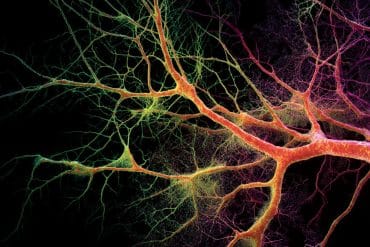Summary: New results from the VITAL randomized trial show that daily vitamin D3 supplementation helps preserve telomere length in older adults, potentially slowing a key biological aging process. Telomeres are protective caps on chromosomes that shorten with age and are associated with chronic diseases.
Over four years, those who took vitamin D experienced significantly less telomere shortening, equivalent to nearly three years of delayed aging, compared to those who took a placebo. These findings support vitamin D as a promising intervention to reduce age-related cellular decline, though more research is needed to confirm long-term benefits.
Key Facts:
- Anti-Aging Effect: Vitamin D3 supplementation slowed telomere shortening over 4 years.
- Cellular Protection: Participants retained the equivalent of 3 extra years of telomere health.
- No Effect from Omega-3s: Omega-3 supplementation did not significantly impact telomere length.
Source: Mass General
Results from the VITAL randomized controlled trial reveal that vitamin D supplementation helps maintain telomeres, protective caps at the ends of chromosomes that shorten during aging and are linked to the development of certain diseases.
The new report, which is published in The American Journal of Clinical Nutrition, is based on data from a VITAL sub-study co-led by researchers at Mass General Brigham and the Medical College of Georgia, and supports a promising role in slowing a pathway for biological aging.
“VITAL is the first large-scale and long-term randomized trial to show that vitamin D supplements protect telomeres and preserve telomere length,” said co-author JoAnn Manson, MD, principal investigator of VITAL and chief of the Division of Preventive Medicine at Brigham and Women’s Hospital, a founding member of the Mass General Brigham healthcare system.
“This is of particular interest because VITAL had also shown benefits of vitamin D in reducing inflammation and lowering risks of selected chronic diseases of aging, such as advanced cancer and autoimmune disease.”
Telomeres are made of repeating sequences of DNA, or base pairs, that prevent chromosome ends from degrading or fusing with other chromosomes. Telomere shortening is a natural part of aging and is associated with an increased risk of various age-related diseases.
A few short-term, small-scale studies have suggested that vitamin D or omega 3 fatty acid supplementation may help support telomeres, but results have been inconsistent.
VITAL is a randomized, double-blind, placebo-controlled trial of vitamin D3 (2,000 IU/day) and omega 3 fatty acid (1 g/day) supplementation that tracked U.S. females aged 55 years and older and males aged 50 years and older for five years.
The VITAL Telomere sub-study included 1,054 of these participants, whose telomere length in white blood cells was assessed at baseline and at Year 2 and Year 4.
Compared with taking placebo, taking vitamin D3 supplements significantly reduced telomere shortening over four years, preventing the equivalent of nearly three years of aging compared with placebo. Omega 3 fatty acid supplementation had no significant effect on telomere length throughout follow-up.
“Our findings suggest that targeted vitamin D supplementation may be a promising strategy to counter a biological aging process, although further research is warranted,” said Haidong Zhu, PhD, first author of the report and a molecular geneticist at the Medical College of Georgia, Augusta University.
Authorship: In addition to Manson, Mass General Brigham authors include Nancy R. Cook, William Christen, and I-Min Lee. Additional authors include Haidong Zhu, Bayu B. Bekele, Li Chen, Kevin J. Kane, Ying Huang, Wenju Li, and Yanbin Dong.
Disclosures: The authors declare that they have no known competing financial interests or personal relationships that could have appeared to influence the work reported in this paper.
Funding: This work was supported by the National Heart, Lung and Blood Institute (R01 HL131674-01). The parent VITAL trial is supported by R01 AT011729. The funders of the study had no role in study design, data collection, data analysis, data interpretation, or writing of the report as well as in the decision to submit the paper for publication.
About this aging research news
Author: Alexandra Pantano
Source: Mass General
Contact: Alexandra Pantano – Mass General
Image: The image is credited to Neuroscience News
Original Research: Open access.
“Vitamin D3 and Marine Omega-3 Fatty Acids Supplementation and Leukocyte Telomere Length: 4-Year Findings from the VITAL Randomized Controlled Trial” by JoAnn Manson et al. American Journal of Clinical Nutrition
Abstract
Vitamin D3 and Marine Omega-3 Fatty Acids Supplementation and Leukocyte Telomere Length: 4-Year Findings from the VITAL Randomized Controlled Trial
Background
Limited studies suggest that vitamin D or omega 3 fatty acids (n-3 FAs) supplementation may be beneficial for telomere maintenance, however, evidence from large randomized clinical trial is lacking. We hypothesized that vitamin D or n-3 FAs supplementation reduce leukocyte telomere length (LTL) attrition overtime by leveraging the VITamin D and OmegA-3 TriaL (VITAL) trial.
Methods
VITAL is a large, randomized, double-blind, placebo-controlled trial with a 2 x 2 factorial design of vitamin D3 (2,000 IU/day) and marine n-3 FAs (1 g/day) supplements for 5 years among a representative sample of 25,871 US females ≥55 and males ≥50 years of age. The VITAL Telomere study (NCT04386577) included 1054 participants who were evaluated in person at the Harvard Clinical and Translational Science Center.
LTL was determined by the Absolute Human Telomere Length Quantification quantitative Polymerase Chain Reaction (PCR) method at baseline, Year 2, and Year 4. The pre-specified primary outcome measures were changes in LTL between baseline, Year 2 and Year 4. Analyses of intervention effect used mixed-effects linear regression models.
Results
LTL was measured in a total of 2,571 samples from the 1031 participants at baseline, year 2, and year 4. Compared to placebo, vitamin D3 supplementation significantly decreased LTL attrition by 0.14 kilo base pairs (kb) (0.01, 0.27) over 4 years (p = 0.039).
Overall trend analysis showed that the vitamin D3 supplementation group had LTLs that were about 0.035 kb higher per year of follow-up compared to placebo group (0.002, 0.07, p=0.037). Marine n-3 FAs supplementation had no significant effect on LTL at either year 2 or year 4.
Conclusion
4-years of supplementation with 2000 IU/day vitamin D3 reduced telomere attrition by 140 bp, suggesting that vitamin D3 daily supplementation with or without n-3 FAs might have a role in counteracting telomere erosion or cell senescence.








